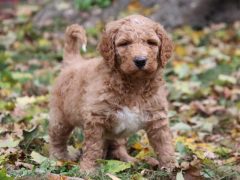
Our F1b-Goldendoodle Puppies in Kentucky
Please Email or call us at 606-303-5184 with any additional questions.
We do not currently have any F1b-Goldendoodle puppies at the moment.
Please get on our newsletter list to be notified once we have more f1b-goldendoodles!
Sign-up for our Newsletter!Please visit these F1b-Goldendoodle puppies at F1B Goldendoodle Puppies for Sale in Dunnville, Kentucky | Blessed Hope Kennels.
About the F1b-Goldendoodle breed.

Genetically, an F1b-Goldendoodle is crossbred of 75% Poodle and 25% Golden Retriever. To get an F1b-Goldendoodle, you must first breed an F1 Goldendoodle and then backcross it with either a 100% Poodle or a 100% Golden Retriever. With the nonshedding and hypoallergenic characteristics, a Goldendoodle breeder will almost always choose to breed an F1 Goldendoodle with a 100% Poodle.
Because it is more nonshedding and hypoallergenic than an F1 Goldendoodle, the F1b-Goldendoodle is the most favored Goldendoodle generation among breeders and customers alike. Because the F1B-Goldendoodle is 75% Poodle, it has a far better possibility of having a wavy or curly coat that doesn't shed and is very hypoallergenic. These are more desirable characteristics in a Goldendoodle, so F1b-Goldendoodles are preferred over F1-Goldendoodles.
Because an F1b is a "second" generation crossbred, they will inherit a lower level of the Hybrid Vigor trait. The Hybrid Vigor characteristic is passed down through the generations of Goldendoodles.
Personality
Poodles come in second, while Golden Retrievers come in fourth in terms of intelligence among the world's most intelligent canines. F1b-Goldendoodle are very intelligent since they cross between two of the most intelligent dog breeds. When it comes to avoiding behavioral issues and negative habits down the line, consistency and positive reinforcement are essential. They make excellent therapy dogs, guide dogs, and service dogs because of their intelligence and caring demeanor.
The Golden Retriever parent's loving disposition makes them excellent friends for just about anyone. Most F1b-Goldendoodle owners, even those with small children, agree that they make wonderful family dogs. The F1b-Goldendoodle temperament makes them ideal family pets and suitable for folks who can spend regular time with a dog.
They are a dog breed that is amiable, gregarious, and people-oriented, making them an excellent choice for families with young children. As a result, if you're going to be gone all day, and F1b-Goldendoodle puppy might not be the best choice for you. They require human interaction and cannot be left alone for extended periods.
Some dogs with this common F1b-Goldendoodle personality feature may experience separation anxiety. As a result, a lonely and bored F1b-Goldendoodle might become unhappy and destructive, leading to difficulties like digging and excessive barking.
A socialized F1b-Goldendoodle, on the other hand, is more likely to become a well-behaved, well-adjusted companion. As a result, socializing and training a puppy should begin at an early age and continue throughout the dog's life.
The majority of F1b-Goldendoodles get along with other canines. However, some people are afraid of dogs they have never met before. As a result, as soon as possible, socialize your F1b-Goldendoodles puppy with other dogs and in different situations.
Caring and Living with F1b-Goldendoodle
Some may consider F1b-Goldendoodles to be high-maintenance dogs. They require enough exercise, daily walks, and mental stimulation. As a result, beginning training at an early age is an excellent approach to ensure that your F1b-Goldendoodle lives a long and happy life. While you might expect an exact mix of a Golden Retriever and a Standard Poodle, F1B-Goldendoodles can have a wide range of appearances.
You can find a curly, wavy, or straight coat on an F1B-Goldendoodle. Brushing and grooming are required regularly, regardless of the coat type. Straight hair coats require more maintenance than curly and wavy hair coats. Around six to twelve months, most F1B-Goldendoodles will have developed their adult coat. You'll know whether the dog's coat will be curly, wavy, or straight once the adult coat grows in. If you're looking for a hypoallergenic dog, wavy and curly coats frequently shed very little.
Dogs with wavy coats resemble teddy bears more closely, which may shed slightly. F1B-Goldendoodles with tighter curls, more closely resembling a Poodle, shed less, are an excellent alternative for allergy sufferers. Grooming is required regularly to keep the coat clear of matting and knots. While some Goldendoodle owners learn to groom their dogs themselves, many Goldendoodle owners choose to have their pets groomed by a professional dog groomer.
While sticks are always a favorite, and F1b-Goldendoodle enjoys toys that include balls. Maybe it's because they're both challenging and chewy. Zuma's favorite balls make a squeaking noise. Nothing makes most F1B-Goldendoodles happier than a spirited game of fetch with their human. At various points throughout the day, a doodle will appear in your face, ball in mouth. They're always prepared to play at any time.
Most F1b-Goldendoodles enjoy classic dog activities like fetch, long walks, and running around the yard. Furthermore, many of these rambunctious dogs want water and can learn to swim. Most F1b-Goldendoodles are docile and easy to teach as long as they get enough exercise. Organized activities are a pleasant method to keep the mind of your F1b-Goldendoodle engaged. Consider agility training, canine good citizen certification, or scent work, to mention a few possibilities. You may also consider organizing Doodle play dates in your community as a fun activity for both you and your dog. Whether you choose to stay at home or go out and explore, your F1b-Goldendoodle will be there for you.